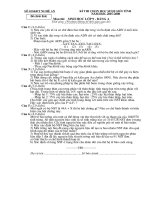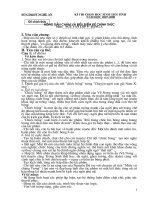Bài soạn de thi hsg tinh nghe an 2010-2011
Bạn đang xem bản rút gọn của tài liệu. Xem và tải ngay bản đầy đủ của tài liệu tại đây (260.51 KB, 7 trang )
S
GD&T
NGH
AN
chớnh
thc
(
thi
gm
05
trang
)
K
THI
CHN
HC
SINH
GII
CP
TNH
LP
12
NM
HC
2010
2011
Mụn
thi:
TING
ANH
LP
12
THPT
-
BNG
B
Thi
gian
lm
bi:
180
phỳt
Họ
v
ten
thí
sinh:
,,,,,,,,,,,,,,,,,,,,,,,,,,,,,,,,,,,,,,,,,,,,,,,,,,,,,,,,,,,,,,,,,,,,,,,,,,,,,,,,,,,,,,,,,,,,,,,,,,,,,,,,,,,,,,,,,,,,,,,,
Ng y
tháng
năm
sinh:
,,,,,,,,,,,,,,,,,,,,,,,,,,,,,,,,,,,,,,,,,,,,,,,,,,,,,,,,,,,,,,,,,,,,,,,,,,,,,,,,,,,,,,,,,,,,,,,,,,,,,,,,,,,,,,
c
J
báo
danh
Học
sinh
tr
ờng
:
,,,,,,,,,,,,,,,,,,,,,,,,,,,,,,,,,,,,,,,,,,,,,,,,,,,,,,,,,,,,,,,,,,,,,,,,,,,,,,,,,,,,,,,,,,,,,,,,,,,,,,,,,,,,,,,,,,,,,,,,,,,,
c
J
phách
Họ
và
ten,
chữ
ký
giám
thị
1:
,,,,,,,,,,,,,,,,,,,,,,,,,,,,,,,,,,,,,,,,,,,,,,,,,,,,,,,,,,,,,,,,,,,,,,,,,,,
Họ
và
ten,
chữ
ký
giám
thị
2:
,,,,,,,,,,,,,,,,,,,,,,,,,,,,,,,,,,,,,,,,,,,,,,,,,,,,,,,,,,,,,,,,,,,,,,,,,,,
Ch ỉ
dẫ n
:
1,
Đề
thi
gồm
05
trang,
Thí
sinh
kiểm
tra
s
J
trang
tr
ớc
khi
làm
bài,
2,
Thí
sinh
làm
bài
trực
tiếp
vào
đề
thi
(ghi
câu
trả
lời
vào
các
ô
đ
ợc
đánh
s
J
phía
d
ới
đề
của
mỗi
phần),
3,
Thí
sinh
giữ
gìn
cẩn
thận
bài
làm,
4,
Nếu
thí
sinh
làm
sai,
dùng
th
ớc
gạch,
không
dùng
bút
tẩy
màu
trắng,
Thí
sinh
chỉ
đ
ợc
dùng
bút
một
màu
xanh
hoặc
đen
để
làm
bài,
Không
dùng
mực
màu
đỏ,
5,
Giám
thị
không
giải
thích
gì
them,
6,
Thí
sinh
không
đ
ợc
sử
dụng
bất
cứ
tài
liệu
nào
kể
cả
từ
điển,
SỞ
GD&ĐT
NGHỆ
AN
Đề
chính
thức
(Đề
thi
gồm
05
trang
)
KỲ
THI
CHỌN
HỌC
SINH
GIỎI
CẤP
TỈNH
LỚP
12
NĂM
HỌC
2010
–
2011
Môn
thi:
TIẾNG
ANH
LỚP
12
THPT
-
BẢNG
B
Thời
gian
làm
bài:
180
phút
ĐIỂM HỌ
TÊN,
CHỮ
KÍ
GIÁM
KHẢO SỐ
PHÁCH
B
ằ
ng
số
:
…………………………………..
B
ằ
ng
c
hữ
:
………………..……………….
G
iá
m
kh
ả
o
1
:
………………………………………
G
iá
m
kh
ả
o
2
:
………………………………………
SECTION
A
–
PHONETICS
I . C hoos e
the w ord w hose unde rl ine d par t is pr onounc e d di ffe re ntly fr om that of the other s.
1. A.
ac h ieve B.
c h oice C.
c h ief D.
broc h ure
2. A.
depends B.
years C.
temples D.
parents
3. A.
nake d B.
sacre d C.
raise d D.
hatre d
4. A.
natu r e B.
futu r e C.
pictu r e D.
matu r e
5. A.
guilty B.
busy C.
bury D.
build
1. 2. 3. 4. 5.
I I . I d e nt i f y
t h e w o r d
w ho s e s t r e s se d p a tt e r n is d i f f e r e n t f r o m that of
the
oth ers .
6. A.
innovation B.
disappear C.
understand D.
identify
7. A.
accompany B.
category C.
interviewer D.
fascinating
8. A.
curricumlum B.
enthusiast C.
subordinate D.
democratic
9. A.
university B.
veterinary C.
undergraduate D.
geographical
10. A.
popular B.
dangerous C.
magazine D.
applicant
6. 7. 8. 9. 10.
Section
B
–
vocabulary
and
grammar
I . C h oo s e
the b e s t
an sw e r f r o m A , B , C or D .
11.
Eighty
kilometers
is
the
fifty
miles.
A.
equivalent
of B.
equivalent
from C.
equal
of D.
equal
to
12.
We
are
prepared
to
overlook
the
error
on
this
occasion
your
previous
good
work.
A.
thanks
to B.
with
a
view
to C.
in
the
light
of D.
with
regard
to
13.
He
is
not
under
arrest,
nor
have
the
police
placed
any
on
his
movements.
A.
restriction B.
obstacle C.
veto D.
regulation
14.
I'd
rather
you
anyone
what
I
said.
A.
don't
tell B.
won't
tell C.
didn't
tell D.
not
to
tell
15.
He
completely
with
what
I
said.
A.
agreed B.
complained C.
argued D.
accepted
16.
of
the
workers
has
his
own
work.
A.
All B.
Each C.
Every D.
Other
17.
There’s
a
beautiful
of
the
old
city
from
the
terrace
of
their
mountain
house.
A.
view B.
aspect C.
vision D.
appearance
18.
Peter
was
really
at
the
prospect
of
starting
work.
A.
exciting B.
excited C.
interesting D.
interested
19.
As
soon
as
you
buy
a
car,
it
starts
falling
in
.
A.
cost B.
worth C.
value D.
price
20.
It
is
vital
that
we
a
change
in
people's
attitudes.
A.
bring
down B.
bring
back C.
bring
about D.
look
after
21.
You
can
drive
my
car
you
drive
carefully.
A.
unless B.
as
long
as C.
because D.
although
22.
it
were
well
paid,
I
would
accept
this
proposal.
A.
Providing B.
Unless C.
But
for D.
If
only
23.
The
police
carried
out
a
search
for
the
missing
diplomat.
A.
thorough B.
through C.
throughout D.
thoughtful
24.
Is
he
enough
to
take
on
so
much
responsibility?
A.
elderly B.
ancient C.
ripe D.
mature
25.
But
for
your
help,
we
in
trouble.
A.
would
have
been B.
would
be C.
had
been D.
were
11. 12. 13. 14. 15.
16. 17. 18. 19. 20.
21. 22. 23. 24. 25.
I I . T h e r e is o n e
m i s t ake
in e a c h of
t h e fo l l o w ing
se nt e n ce s . F ind and
c o rr e c t
i t .
26.
It
was
suggested
that
Pedro
studies
the
material
more
thoroughly
before
attempting
to
pass
the
exam.
27.
Tom
has
not
completed
the
assignment
yet
and
Maria
hasn’t,
neither.
28.
The
United
States
receives
a
large
amounts
of
revenue
from
taxation
of
tobacco
products.
29.
Not
only
cigarettes
and
alcohol
is
believed
to
be
harmful
to
one’s
health.
30.
She
has
changed
a
lot
of
jobs
since
she
has
graduated
from
university
five
years
ago.
31.
John
could
have
gotten
that
job
if
he
had
applied
it.
32.
Because
they
had
spent
too
many
time
considering
the
new
contract,
the
students
lost
the
opportunity
to
leave
the
appartment..
33.
Whistling
or
clapping
our
hands
to
get
the
person’s
attention
are
considered
impolite.
34.
Despite
the
time
of
the
year,
yesterday’s
temperature
was
enough
hot
to
turn
on
the
air
conditioning.
35.
Found
in
the
12
th
century,
Oxford
university
ranks
among
the
world’s
oldest
universities.
Mistake Correction Mistake Correction
26. 31.
27. 32.
28. 33.
29. 34.
30. 35.
Section
C
–
reading
I . R e ad
t h e fo l l o w ing pa s s ag e , and t h e n
c hoo s e
t h e b es t an s w e r f r om A ,
B , C or D .
Accreditation
is
a
system
for
setting
national
standards
of
quality
in
education.
The
United States
is
unique
in
the
world
because
its
accreditation
is
not
administered
by
the
government,
but rather
by
committees
of
educators
and
private
agencies
like
the
Middle
State
Association
of Colleges
and
Secondary
School
and
the
Society
of
Engineers.
Before
registering
to
study
in
any
education
institution
in
the
United
States,
a
student
should
make
certain
that
the
institution
is
accredited
in
order
to
assure
that
the
school
has
a
recognized standard
of
organization,
instruction,
and
financial
support.
Foreign
students
should
be
particularly
careful
to
check
an
institution’s
accreditation
because
other
government
or
future
employers
may
not
recognize
a
degree
earned
from
a
school
that
has
not
received
accreditation.
If
a
college
is
accredited,
catalogs
and
brochures
will
usually
indicate
the
accreditation
status.
If
you
are
not
sure
about
a
certain
school,
don’t
hesitate
to
check
its
reputation
with
an
education
officer
at
the
nearest
US
embassy.
36.
The
title
best
expresses
the
ideas
in
this
passage
is
.
A.
studying
in
the
United
States
B.
accreditation
C.
how
to
find
best
school
D.
the
middle
States
Association
of
colleges
and
Secondary
Schools
37.
What
should
students
do
in
order
to
check
the
accreditation
of
a
school
that
may
interest
them
?
A.
Write
to
the
school B.
Write
to
the
US
Ministry
of
Education
C.
Register
to
study
at
the
school D.
Consult
a
US
embassy
official
38.
According
to
the
author,
all
of
the
following
statements
are
true
of
the
accreditation
system
in
the
United
States
EXCEPT
.
A.
The
accreditation
on
status
of
a
school
will
be
listed
in
its
catalogs
and
brochures.
B.
Future
employers
will
be
influenced
by
the
accreditation
of
a
candidate’s
school.
C.
The
accreditation
system
is
like
that
of
many
other
countries..
D.
Accreditation
provides
information
about
the
standards
of
instruction
and
organization
of
a
school.
39.
The
word
“unique”
in
the
first
paragraph
means
.
A.
unusual. B.
first. C.
standard. D.
large.
40.
From
this
passage,
it
may
be
concluded
at
an
accredited
school
.
A.
does
not
offer
a
degree.
B.
may
close
because
of
financial
disorganization.
C.
is
administered
by
the
government.
D.
is
better
than
an
accredited
school.
36. 37. 38. 39. 40.
I I . C hoo s e
t he
b e s t an s w e r f r o m A , B , C or D
t o
fi l l in the ga p s in the
fo l l o w ing pa s s a ge .
The
(41)
of
book
knowledge
is
one
part
of
school
education
but
this
kind
of
learning
can
be
and
often
is
carried
to
(42)
in
many
countries
so
that
no
time
for
other
interests
is
(43)
to
young
people.
Not
only
must
they
attend
school
(44)
five-hour
periods
on
six
days
of
the
week,
studying
possibly
as
many
as
thirteen
different
subjects,
but
in
addition
they
may
even
go
to
afternoon
institutes
for
(45)
instruction.
They
have
almost
no
chance
of taking
(46)
any
of
their
own
hobbies
or
becoming
familiar
with
the
plants
and
(47)
life
of
the
countryside
except
during
their
summer
holidays.
Early
youth
should
be
a
time
of exploration
and
adventure,
of
reading
books
for
(48)
as
well
as
study,
of
freedom
to
enjoy
life
before
the
responsibilities
of
working
for
a
living
and
(49)
a
family
(50)
an
end
to
study,
to
freedom
and
only
too
often
to
carefree
enjoyment.
41. A.
gathering B.
collection C.
obtaining D.
accumulation
42. A.
extremity B.
excess C.
limits D.
boundary
43. A.
available B.
provided C.
devoted D.
reserved
44. A.
during B.
for C.
throughout D.
in
45. A.
farther B.
additional C.
extra D.
further
46. A.
on B.
up C.
back D.
over
47. A.
untamed B.
original C.
wild D.
natural
48. A.
pleasure B.
amusement C.
joy D.
entertainment
49. A.
creating B.
bringing C.
building D.
raising
50. A.
hold B.
put C.
indicate D.
mark









